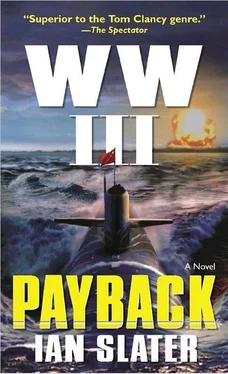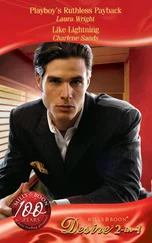“Bullshit! I wan’ that plane. Honda jet, eh?” The Honda Executive jets had displaced the Lear as a status symbol. “Half an hour,” he added. “Half an hour.” His friend whispered to him. “Yeah, an’ two million dollars!” The friend whispered to Gonzales again, who nodded eagerly, his voice infused with bravado. “Yeah, an’ no dye, no sequential noombers. You understan’?”
“I understand, Mr. Gonzales, but you don’t,” said Fine, his arms unfolded unthreateningly, his hands clearly visible, to show he wasn’t holding anything. “We can get you the plane, but the money — that’s two hours minimum, Mr. Gonzales.”
“Bullshit. Half an hour or these people are gonna die. You understan’? Half an hour. ”
“Impossible,” said Fine calmly. “An hour, we can do it.”
A putrid smell invaded the air, a not unusual occurrence in a group of hostages terrified that they were going to die.
The two Guatemalans conferred. “Okay,” said Gonzales. “One hour maximum. You understan’?”
It was 4:00 A.M. at Margaret’s house in Monterey when Douglas Freeman saw the CNN Headline News story of the “alleged” bomber in Dallas/Fort Worth. Marte Price, looking her usual unflappable sexy self, even at this late hour, revealed — in the absence of visuals — that the two “Central Americans,” believed to be either Guatemalan or Honduran, were rumored to be holding a map case that they were claiming was a bomb. Freeman tried to get through to the CNN newsroom to speak to Marte during a commercial break.
“General who?”
“Douglas Freeman, General Douglas Freeman.” These kids, he mused, didn’t know squat about American history or any other history. He recalled the latest “National Geographic” test given to eighteen- to twenty-four-year-old high school— and college-educated kids throughout Europe, the U.S., and Russia, asking them to identify ten countries on a world map. The U.S. kids came second last. And the present generation’s knowledge of history, of their own country’s history, was even worse. If they knew squat about the Civil War, they sure as hell weren’t going to remember him.
“Douglas?” It was Marte on the line. “I’ve only got thirty seconds till I’m back on air. What’s up?”
“Marte, that map case this nut at Dallas/Fort Worth is holding. I need to know how long it is.”
“How long — oh Jesus, you think it could be another shoulder-fired — amber light’s on, Douglas. Gotta go. I’ll try to find out.”
“Don’t broadcast it. It’ll freak everyone out.”
“And a bomb wouldn’t?”
She was right. Hostages at the airport’d probably feel safer if they thought it was a missile. A missile doesn’t blow up on the spot. It had to travel before exploding. Hell, it didn’t matter; the waiting room in question at the Dallas/Fort Worth terminal was tightly packed, including the protective double ring of hostages. Shrapnel alone from a missile fired in such a confined space and hitting a wall would cause carnage. Freeman’s indomitable pop-up icon in the margin of his new laptop was smiling, bowing in joyful obsequiousness, informing the general that he had mail.
The e-mail was from Choir Williams, in response to the general’s e-mail informing Choir about the general and Aussie identifying the Igla and Vanguard missiles.
“Police, Homeland Security, et al.,” wrote Choir, “are saying that they’re looking for three-man teams. But the missiles you and Aussie have ID’d — a Chinese Vanguard 3D and a Russian Igla 2C — are one -operator MANPADs. We maybe should be looking for two-man teams at each airport? A spotter-driver and a shooter. What do you think, General?”
Freeman shook his head in admiration at Choir Williams’s observation, and while he waited for CNN to take a commercial break so that Marte could call him back about the size of the map case, he forwarded Choir’s conclusion directly to Homeland Security while keeping one eye on Marte. She was easy to watch, had a figure like Margaret’s. Both examples of women who, to borrow a self-righteous yuppie phrase that he’d grown thoroughly sick of, had not only “worked out, eaten right,” but had also protected their alabaster skin from the ravages of the sun.
He was tired, but wanted to wait for Marte’s call or e-mail about the length of the Guatemalan’s so-called map tube before he informed Eleanor Prenty that the airport at Dallas Fort Worth might have another MANPAD on their hands, or, just as likely, an empty MANPAD-launcher case, because if you were a terrorist and had fired off a missile, surely you would have already dumped the case, like the launchers found at JFK and LAX?
The general moved quietly through the living room, past the vase of hothouse roses and into the kitchen to pour himself another coffee. It was the best Columbian java he’d ever tasted. Margaret ground the beans with the same thoroughness with which she did everything else. Dangerous stuff — so velvety, not a trace of that iron-filing detritus crap they brewed in every church basement and military camp in America. Margaret’s coffee was so smooth, you’d drink three or four cups before you knew it. Keep you up for a week. Strange thing — while standing there looking out at the dark, star-spangled sky, he experienced a psychological phenomenon he’d undergone before, following long stretches of high-tension fatigue at HQ or in the field — the more dry-eyed exhausted you were, pumped up with caffeine, the harder your johnson would become. He’d once asked his division’s chief surgeon about it.
“Quite common, General,” the doctor had told him. “Nothing to worry about.”
“I’m not,” Freeman had responded. “Just surprised. Would have thought fatigue — you know, long hours — would send the dragon into rest mode.”
“Sometimes,” the doctor conceded. “But any kind of stimulant can pump it up stiffer’n a cucumber — no letup. In combat, as you well know, Douglas, it shrinks to nothing. Same with your anus, right? Pucker factor. But after, the tension inside has to get out.”
Now, watching Marte Price on CNN, Douglas, sitting back in the recliner, felt the cucumber starting to ache.
Margaret appeared with more coffee, the flickering television’s light silhouetting her momentarily, her perfume washing over him. “Everything all right?”
“What? — oh, yes,” he said, straightening up in the sofa and pressing the remote’s Mute button. “I’m sorry. Did I wake you? Meant to keep the noise down.”
“No, no, I don’t mind,” she said, adding, “but I’m worried about you,” before realizing she’d violated her own noninterference rule. He was a big boy — a legend like Douglas Freeman didn’t need a nanny, for goodness’ sake. He could see he’d kept her awake but had obviously attributed it to his networking rather than realizing the truth, that her tossing and turning had been occasioned by her worry and excitement. She feared that somehow all these missile attacks would take him away from her, to ensnare him in yet another of his sudden trips “abroad,” as he used to euphemistically describe his sudden Special Forces deployments to Catherine. Margaret knew Douglas wasn’t liked by jealous colleagues at the Pentagon, but in times of national crisis — such as Bosnia, 9/11, and the two Iraqi wars, reserves were badly needed from the pool of retired officers and National Guard personnel.
There was a moment of silence, Margaret sitting down beside him on the sofa, the images on the TV a collage of JFK, LAX, and Dallas/Fort Worth. “The country should have been prepared for this,” Freeman said. “We should have seen it coming.” He gave Margaret an enigmatic smile. “I’m an old Boy Scout. Be prepared.”
Читать дальше












